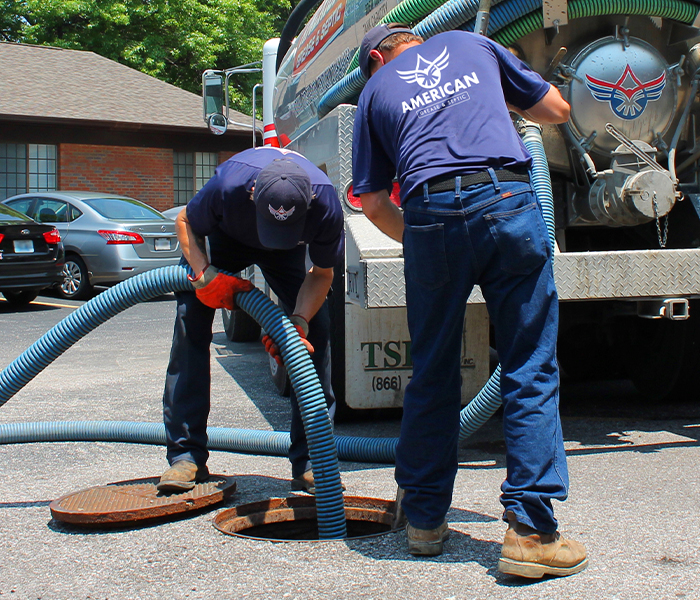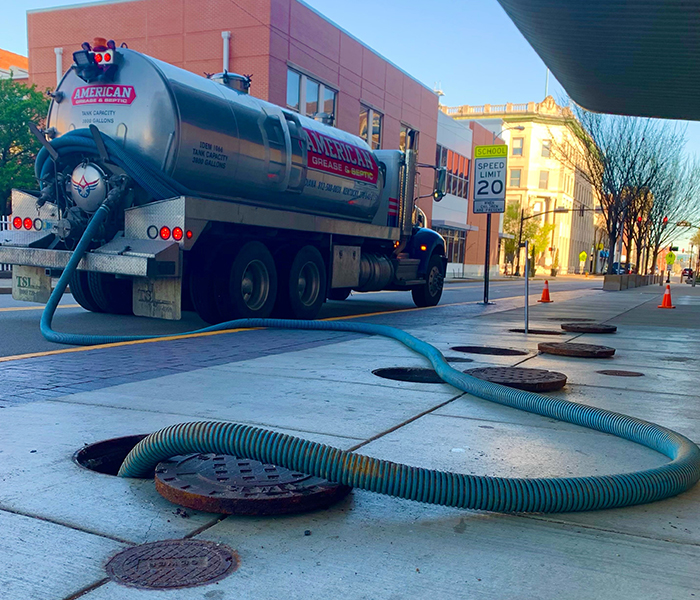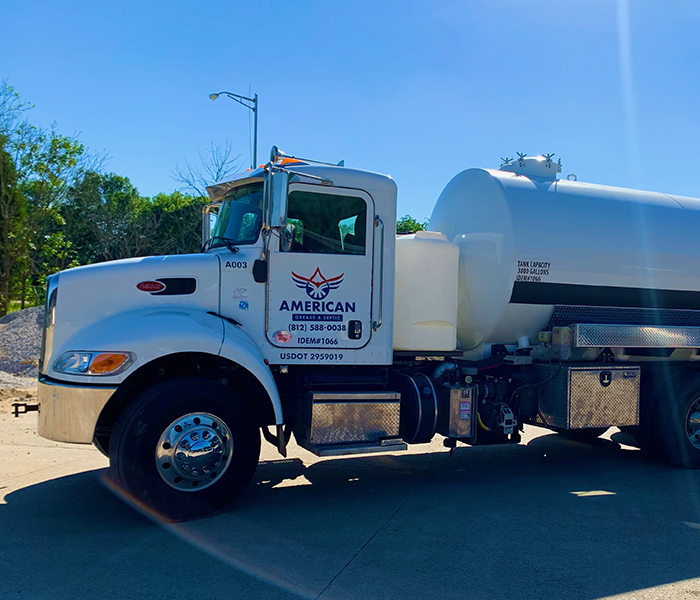Grease Trap Cleaning Services
American Grease and Septic cleans and maintains grease traps for restaurants and food service businesses in the industry. Restaurants and food establishments must have a grease trap.
The purpose of the grease trap is to separate fats, oils, grease, and solids from the water leaving the building. The water then is returned to the city wastewater and sewer lines. If you don't clean your grease trap and dispose of fats, oils, and grease correctly, you could face costly fines. It can also cause unpleasant odors, blockages, and potentially force your business to close.

Expert Grease Trap Services: Professional, Reliable & Fully Compliant
American Grease and Septic provides top-notch grease trap cleaning services. These services can assist you in meeting regulations and ensuring that your grease lines function properly.
Compliance with regulations is important for maintaining a safe and efficient kitchen environment. Keeping your grease lines in good working condition is essential for preventing clogs and backups. Our services are hassle free so you can focus on what is most important – your customer.
Timely service windows
Photo documentation
Automatic service reports
Appointment reminders and notifications
Customized grease maintenance programs
Service checklist emailed
Compliant waste manifests
Services provided during non-peak hours
Licensed Professionals for Trusted Grease Trap Services
It is important to consult with a licensed and knowledgeable professional like American Grease and Septic to help you determine the best frequency for your grease trap service.

High Quality Grease Trap Services
American Grease and Septic is a regional leader for cleaning and maintaining grease traps in the food service industry. We pride ourselves on exceeding expectations to ensure we do the job right.
100% evacuation
Scrape and clean walls and baffles
Pressure washing
Grease lateral jetting
Check water flow
System condition inspection and reporting
Industries We Serve
Restaurants
Churches and Community Kitchens
Schools and Colleges
Commissary Kitchens
Casinos
Concert Venues and Stadiums
Hotels
Movie Theaters
Daycare Facilities
Healthcare

Experienced Technicians Offering Professional Grease Trap Services
American Grease and Septic works with different teams to provide various services associated to your grease trap cleaning. When you work with American Grease and Septic, you receive advice from experts. These experts have over 40 years of experience in the industry.
In addition, we work with local government agencies to execute your needs on the highest level. We pride ourselves on staying 100% compliant with city ordinances and have built a reputation for doing the job right.
We know our service is essential for your business, not just a luxury. Our team will keep you informed about the newest policies to help you stay up-to-date. We provide you with peace of mind by maintaining a recurring schedule of your grease trap maintenance and cleaning.
24/7 Emergency Grease Trap Service: Always Ready When You Need Us
Dedicated Grease Trap Cleaning
American Grease and Septic offers 24-hour emergency response 365 days a year.

What is a Grease Trap?
A grease trap is a plumbing device that is installed in a drainage system to intercept fats, oils, and greases (FOG) before they enter the sewer system. FOG can build up in sewer lines and cause blockages, backups, and overflows. Grease traps help to prevent these problems by slowing the flow of wastewater, allowing the FOG to cool and solidify, and then collecting it in a separate chamber.
Grease traps are required by law in many jurisdictions for businesses that generate large amounts of FOG, such as restaurants, food processing facilities, and car washes. They can also be used in homes with large kitchens or that do a lot of cooking.
Grease traps must be regularly pumped out by a licensed professional to prevent them from overflowing. The frequency of pumping will vary depending on the amount of FOG that is generated.

Why Does A Grease Trap Need To Be Cleaned?
The frequency with which a grease trap needs to be cleaned depends on several factors, including the amount of FOG that is generated, the size of the trap, and the type of business. In general, grease traps should be cleaned at least once a month. However, some businesses may need to have their grease traps cleaned more often.
Here are some of the reasons why a grease trap needs to be cleaned:
To prevent backups and overflows. When FOG builds up in a grease trap, it can solidify and clog the trap. This can lead to backups and overflows, which can damage your plumbing and property.
To prevent health problems. Bacteria can grow in grease traps, which can lead to health problems. For example, bacteria can cause food poisoning.
To comply with regulations. In many jurisdictions, businesses are required to have their grease traps cleaned on a regular basis. This is to help prevent sewer backups and overflows, which can pollute the environment.
Grease Trap Pumping FAQ's
What is a grease trap?
A grease trap captures fats, oils, and grease (FOG) from commercial kitchens and prevents them from entering the wastewater/sewer system.
How often should I get my grease trap pumped?
The frequency of grease trap pumping depends on the size of the trap, the amount of FOG generated by your kitchen, and any mandates enforced by your local environmental management agency. Typically, it is recommended to have it pumped every 3 months for outdoor gravity grease interceptors and 1-3 months for indoor hydromechanical grease traps.
What are the consequences of not pumping a grease trap regularly?
If a grease trap is not pumped regularly, FOG can build up and cause blockages in your plumbing system, leading to backups, odors, and potential kitchen closures. Additionally, prolonged exposure of grease will deteriorate concrete (common outdoor tank material).
How do you pump a grease trap?
Our technicians will first locate and safely uncover your grease trap. Then, using vacuum trucks and pressure washers, they will fully evacuate the grease trap waste, wash and scrape the tank, inspect for system issues and dispose at a wastewater treatment facility. A service checklist and photos from the job will be sent to your email.
Can I dispose of FOG myself?
It is not recommended to dispose of FOG down the drain or in the trash. Our company offers specialized services to keep you compliant and your system operating correctly.
Bundle & Save Program
If you're looking to save money on essential services while also simplifying your maintenance schedule, then this program is perfect for you. By combining the Grease Trap pumping with our Used Cooking Oil collection service, you can save money and enjoy a streamlined experience with one trusted service provider.